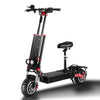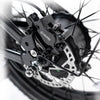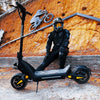Riding an Electric Scooter on Hilly Roads: What to Know Before You Climb

Electric scooters are a smart and eco-friendly way to move around cities—but what happens when your commute includes a few steep hills? Whether you live in a city like Lisbon, San Francisco, or a suburban neighborhood with hilly terrain, it’s essential to understand how an electric scooter performs when elevation changes come into play.
In this guide, we’ll break down how hills affect electric scooters, what features matter most when riding uphill, and which GTXR models are built to handle inclines with confidence.
The Science of Climbing: What Hills Demand from Your Scooter
Climbing a hill requires more than just power—it also demands smart torque management, traction, and braking.
Key factors affected by hills:
• Motor power: More watts = more torque = better climbing
• Battery strain: Inclines use up energy faster than flat roads
• Speed: Expect slower acceleration uphill
• Temperature: Motors can heat up more quickly on climbs
• Braking: Downhill control requires strong, reliable brakes
How to Judge a Hill’s Difficulty
The steepness of a hill is measured in grade percentage:
Slope Grade Description Example
0–5% Flat to mild slope Typical city incline
6–10% Moderate hill Small suburban hills
11–15% Steep hill Residential climbs
16%+ Very steep (challenging) Mountainous or scenic routes
For most electric scooters, anything above 15% grade requires a strong motor and high torque.
What You Need in a Hill-Ready Electric Scooter
To handle hilly terrain, choose a scooter with the following features:
1. Powerful Motor (500W or higher)
• Look for continuous motor output of at least 500W; peak output matters too
• Dual motor setups can improve climbing on aggressive inclines
2. High-Capacity Battery
• 48V battery systems offer better torque and efficiency under load
• Large capacity (≥600Wh) helps sustain power without overheating
3. Advanced Braking System
• A combination of electronic and mechanical brakes is essential for downhill safety
4. Pneumatic Tires
• Air-filled tires provide better grip and traction on uphill or uneven roads
5. Rear-Wheel Drive or Dual Drive
• Rear motors provide more torque for climbing, while dual motors offer balance and extra push
GTXR Models Built for Hill Climbing
GTXR DT06
• Motor: 500W continuous, 800W peak
• Gradeability: Up to 20%
• Battery: 48V 15Ah (720Wh)
• Braking: Dual disc + electric regenerative brake
• Tires: 10-inch pneumatic for extra grip
• Frame: Reinforced chassis for weight support on climbs
Perfect for cities with medium to steep hills. The DT06 delivers consistent torque and battery reliability, even when roads get tough.
GTXR G50 (with Happyrun collaboration)
• Motor: 1000W peak output
• Fat tires: Better surface grip on gravel or steep gradients
• Suspension: Advanced dual suspension
• Design: Suited for hill-heavy, off-road hybrid conditions
A high-performance model for riders in hilly or rural regions where terrain varies.
Tips for Riding on Hills
• Start with momentum: Don’t approach hills from a dead stop if possible
• Shift your weight slightly forward: Helps with traction and balance
• Use Eco mode downhill: Avoid overspeeding and reduce strain on brakes
• Brake early and evenly: Especially on wet or winding descents
Don’t Forget Downhill Safety
Going up is only half the challenge—descending safely is critical. Always ensure your scooter has:
• Responsive brakes (hydraulic or mechanical disc recommended)
• Speed control features like regenerative braking or cruise limiters
• Wide tires with good tread depth to prevent slipping
Final Thoughts: Choose the Right Tool for the Terrain
Not every electric scooter can handle hills—but the right one will make your commute smoother, safer, and more efficient. At GTXR, we design scooters with climbing power and structural stability in mind, so that even the steepest parts of your route are under control.
Whether you’re navigating steep alleys or long suburban grades, GTXR scooters like the DT06 and G50 give you the torque, range, and durability needed to conquer any climb.
Visit gtxrstore.com to explore models made for elevation—and take your ride to new heights.





